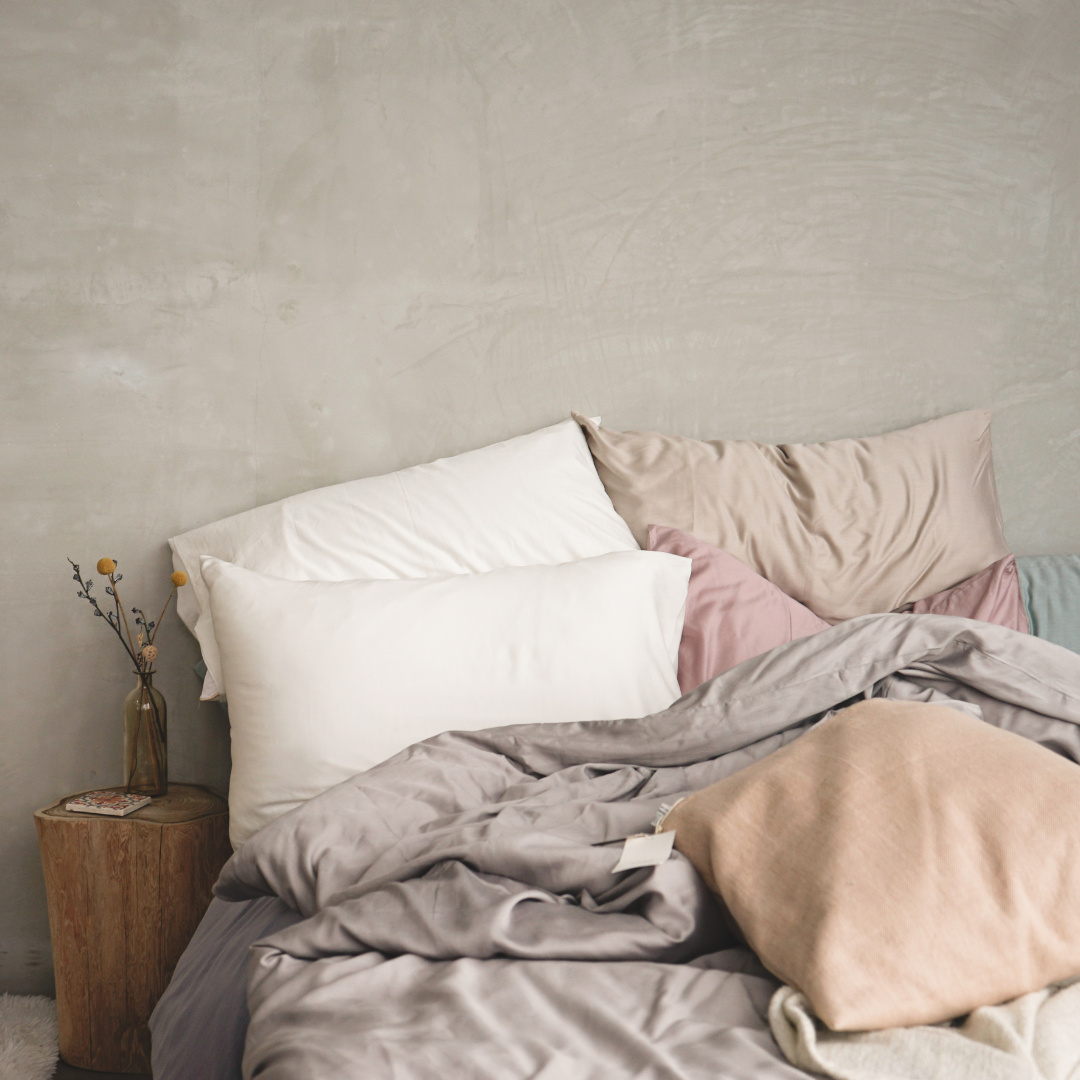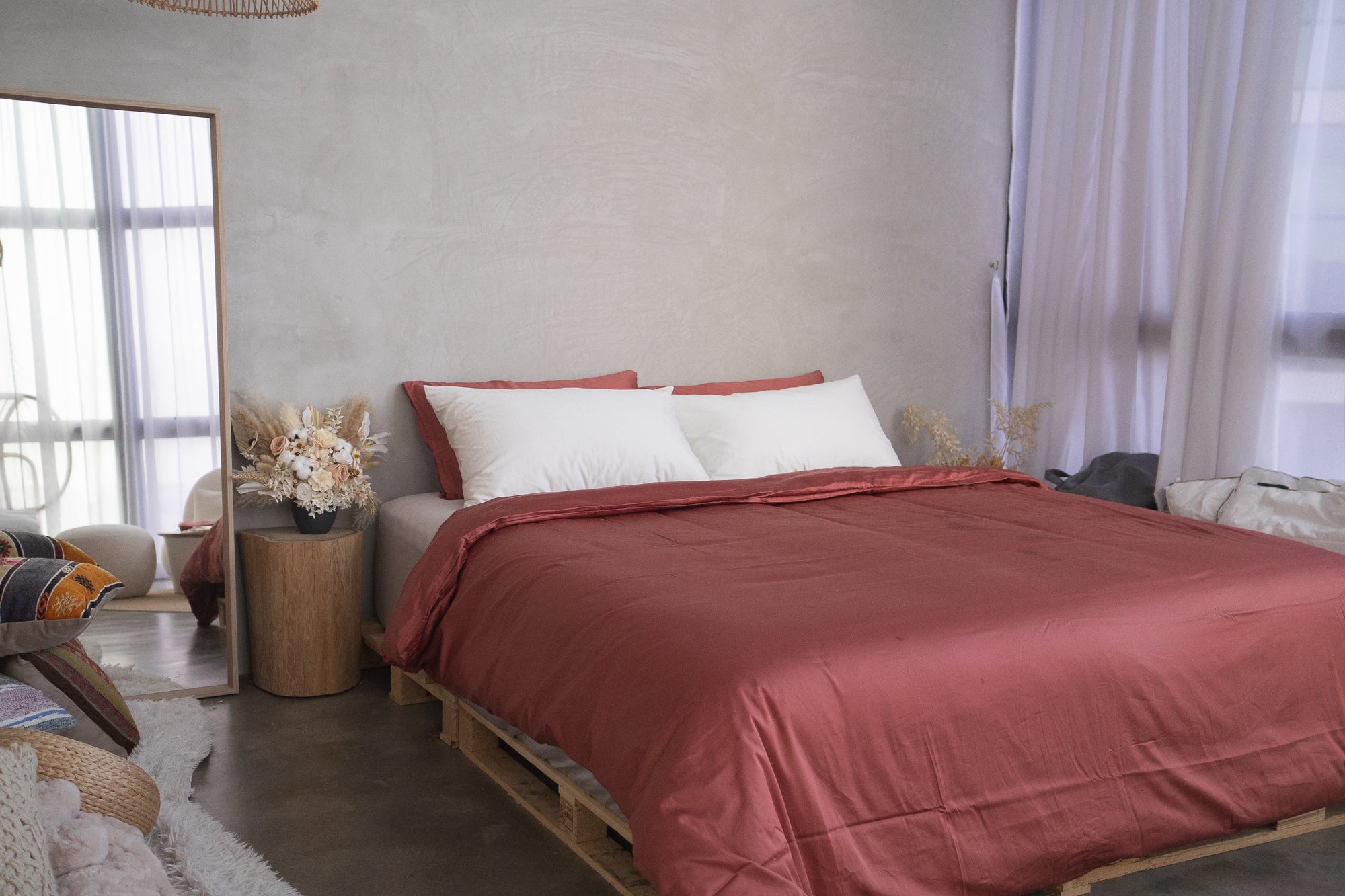When it comes to cultivating a comfortable and tranquil sleep environment, the selection of bed sheets plays a pivotal role. The choice of bedding material has a huge impact on aspects such as comfort, temperature regulation, and long-lasting quality. Among the diverse array of available options, bamboo and Tencel™ have gained considerable popularity due to their distinct characteristics and advantages. In this article, we will explore the realm of bamboo and Tencel™ sheets, conducting a comprehensive comparison of their features, benefits, and potential drawbacks.
Tencel™

Tencel™ sheets have gained recognition in the bedding industry for their exceptional qualities and sustainable production process. Tencel™, also known as lyocell, is a fabric derived from the pulp of eucalyptus trees. Let's delve into the notable aspects of Tencel™ sheets.
Pros.
1. Exceptional Moisture Absorption and Temperature Regulation
Tencel™ sheets excel in moisture absorption, even more so than cotton or bamboo. The unique structure of Tencel™ fibres allows them to absorb moisture efficiently, keeping you cool and dry throughout the night. This attribute is particularly advantageous for individuals who experience night sweats or live in humid climates. Additionally, Tencel™'s excellent temperature-regulating properties help to maintain a comfortable sleep environment.
2. Silky-Smooth and Luxurious Feel
Tencel™ sheets are renowned for their luxurious texture and silky-smooth touch. The fine fibres are carefully woven, creating a fabric that feels gentle and soothing against the skin. The smooth surface of Tencel™ sheets reduces friction, preventing skin irritation and hair tangles during sleep, enhancing overall comfort.
3. Eco-Friendly Production Process and Sustainable Sourcing
Tencel™ production stands out for its sustainable practices. The eucalyptus trees used to create Tencel™ fibres require minimal water and do not rely on harmful pesticides or insecticides. The manufacturing process employs a closed-loop system, where the solvent used to dissolve the pulp is recycled, minimising waste and reducing environmental impact. Tencel™ sheets are an excellent choice for eco-conscious individuals seeking sustainable bedding options.
4. Quality Ensured
As Tencel™ is a company that specialises in the fibre itself, their quality can be assured and tracked.
However, it's important to acknowledge a couple of limitations when considering Tencel™ sheets.
Cons.
1. Higher Price Point
Tencel™ sheets, compared to some other bedding materials, may come with a slightly higher price tag. This can be attributed to the sustainable production process and the quality of the fabric. While the initial investment may be higher, the durability and comfort of Tencel™ sheets make them a worthwhile long-term investment.
Bamboo

Photo by zoo_monkey on Unsplash
Bamboo sheets have gained popularity in recent years as an eco-friendly and cooling bedding option. These sheets are crafted from bamboo fibres, which undergo a process to create a soft and durable fabric. Here are some key aspects to consider when it comes to bamboo sheets.
Pros.
1. Breathability and Moisture-Wicking Abilities
Bamboo sheets are known for their excellent breathability, allowing for enhanced airflow and ventilation. The natural properties of bamboo fibres help to regulate body temperature by wicking away moisture, keeping you cool and dry throughout the night. This feature is particularly beneficial for individuals who tend to sleep hot or experience night sweats.
2. Hypoallergenic and Antimicrobial Properties
Bamboo sheets offer hypoallergenic qualities, making them an excellent choice for those with allergies or sensitive skin. The fibres naturally repel dust mites and mold, reducing the risk of allergic reactions. Additionally, bamboo possesses inherent antimicrobial properties, inhibiting the growth of bacteria and maintaining a cleaner sleep environment.
3.Softness and Durability
One of the standout characteristics of bamboo sheets is their soft and silky feel. The fabric drapes smoothly against the skin, offering a luxurious sensation. Moreover, bamboo fibres are highly durable and resilient, with the ability to withstand regular washing and maintain their quality over time.
However, it's important to note a couple of potential drawbacks associated with bamboo sheets.
Cons.
1. Variability in Quality due to Manufacturing Processes
The quality of bamboo sheets can vary depending on the manufacturing techniques employed. Some lower-quality options may blend bamboo fibres with synthetic materials or undergo chemical treatments that can compromise their overall sustainability and comfort. It is advisable to choose bamboo sheets from reputable brands that prioritize eco-friendly and ethical production methods.
2. Environmental Concerns Related to Chemical Processing
While bamboo itself is a sustainable and fast-growing plant, the processing methods used to transform it into fabric can involve chemicals, such as sodium hydroxide, which raises concerns about environmental impact. Opting for bamboo sheets that are certified as organic or produced using closed-loop manufacturing processes can help mitigate these concerns.
Comparison
Now that we have explored the features and advantages of both bamboo and Tencel™ sheets, let's compare and contrast the two materials to help you make an informed decision:
1. Breathability and Moisture Management
Both bamboo and Tencel™ sheets excel in breathability and moisture-wicking abilities. However, Tencel™ has a slight edge in terms of moisture absorption and temperature regulation. The exceptional moisture management properties of Tencel™ sheets make them ideal for individuals who prioritize staying cool and dry throughout the night.
2. Softness and Comfort
Bamboo sheets are known for their soft and luxurious feel, comparable to high-quality cotton. On the other hand, Tencel™ sheets offer an exceptionally smooth and silky texture, providing a luxurious sleep experience. The choice between the two ultimately comes down to personal preference and the specific tactile sensation you desire.
3. Sustainability and Eco-Friendliness
Both bamboo and Tencel™ sheets offer eco-friendly alternatives to conventional bedding materials. Bamboo is a renewable resource and grows quickly without the need for pesticides or fertilizers. However, concerns arise regarding the chemical processing methods used to transform bamboo into fabric. In contrast, Tencel™ production utilizes a closed-loop process, minimising waste and employing sustainable sourcing methods. If sustainable manufacturing practices are a priority for you, Tencel™ sheets may be the preferable choice.
4. Durability and Longevity
Bamboo sheets are generally durable and can withstand regular use and washing. However, the quality may vary depending on manufacturing processes and fibre blends. Tencel™ sheets are also known for their durability and ability to retain their quality over time. Both options can offer long-lasting bedding, but it is essential to choose reputable brands that prioritise quality and craftsmanship.
(Fabric Crafter’s Tip) All fabric will wrinkle but Tencel™ Lyocell fibres are less prone to wrinkling as its made of nanofibrils - tiny but strong fibres that are good at absorbing moisture.
Overall Winner: Tencel™
Tencel™ sheets emerge as an attractive option for individuals seeking a luxurious and eco-friendly bedding material. The superior moisture management, silky-smooth texture, and sustainable production process make Tencel™ sheets a compelling choice. However, bamboo sheets remain a viable option, especially for those who prioritise softness and affordability.
Ultimately, the decision between bamboo and Tencel™ sheets will depend on your specific preferences, budget, and environmental considerations. It is advisable to carefully assess the qualities of both materials and select the one that aligns with your desired sleep experience and values.
After delving into the world of bamboo and Tencel™ sheets, comparing their features, advantages, and potential drawbacks, it is clear that both materials offer unique qualities for a comfortable sleep experience. However, considering the subtle bias towards Tencel™ sheets, it is evident that they possess several notable advantages.
Tencel™ sheets stand out for their exceptional moisture absorption, temperature regulation, and silky-smooth texture. The sustainable production process and eco-friendly sourcing make them an excellent choice for individuals seeking bedding materials that prioritise both comfort and environmental consciousness.
That being said, bamboo sheets still hold their ground as a soft, durable, and breathable option, particularly for those seeking a more affordable alternative. The decision between bamboo and Tencel™ sheets ultimately rests on personal preferences, budget considerations, and environmental values.

